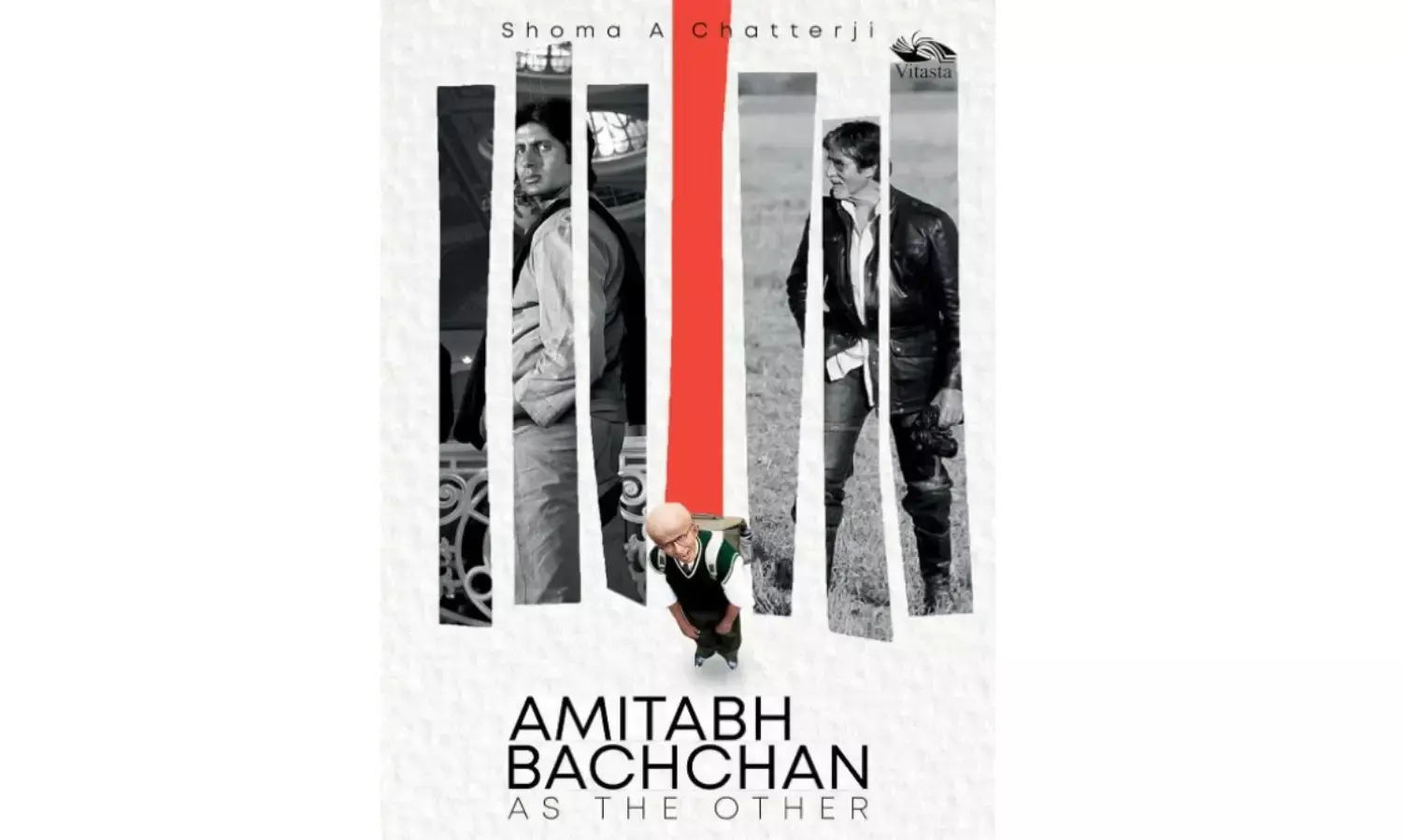Amitabh Bachchan As The Other
Shoma A. Chatterjee’s new book is a must read for fans as well as critics;

Amitabh Bachchan, the name synonymous with the evolution of Bollywood from the turbulent 1970’s to the hi-tech, content driven Hindi movies of our current times, is also the emblem of the nostalgia, star struck madness and the unnamed liberation of our make-believe worlds that us, the 80’s and 90’s generation would closely associate with.
The unusual bodily and visceral appeal of Bachchan that seeped through the senses of the cine-goers in the two decades when he was the undisputed ‘badshah’ (king) of Hindi movies, and the evolution of his persona in the films he was associated with in his more mature years, all of it has been the discourse and a subject worth exploring in the domain of film studies and popular culture.
When I first got to know about veteran film journalist and critic Shoma A. Chatterjee’s recently released book ‘Amitabh Bachchan As the Other’, the title intrigued me. But I had expected yet another cinematic exposition of the biography and the analysis of the life and times of the superstar.
However, once I delved into the pages of her book, I realised that the author, film critic was actually emphasising on the haunting image of Amitabh Bachchan as the ‘Other’.
The author emphasised the cinematic prowess of the actor in some films that stood out and how all these films he acted in smashed stereotypical notions centred on heroism in Bollywood, and also how he represented the image of ‘The Other’, delving deep into the psyche of the characters he played.
It is Chatterjee’s deft analysis of the nuances of various characters he played on screen, the various aspects of the plot/storylines of selected films visualised by her critical lens, that helps us readers understand why and how the image and persona of Amitabh Bachchan becomes the phenomenal ‘Other’ in terms of the development of the respective roles he played in those films.
This itself becomes the USP, the memorable vision behind the book. Whether it is her analysis of the friendship between two friends from diverse backgrounds and the tragedy that ensues when their destinies converge in ‘Namak haram’, or her critical study of lesser-known films like ‘Saudagar’ where she illustrates the male chauvinism and the final nemesis of Moti Miyan (played by Bachchan), the metaphorical truths of the protagonists unravelled by her, are shaped by her fine cinematic understanding stand out.
I am particularly fond of her nuanced interpretation and analysis of Subir’s character in the film ‘Abhimaan’ (1973) directed by master filmmaker Hrishikesh Mukherjee in which the author has drawn on the complex emotional and musical journey of both Subir and Uma (played by Amitabh and Jaya Bachchan respectively) and the internal conflicts which tear their lives apart, then finally the way their paths merge together again.
I loved reading the chapter particularly due to my own affinity with the contents of the film.
A discerning film scholar, freelance journalist, author, Chatterjee has received prestigious senior research fellowships from the National Film Archive of India (2005–2006) and also from the PSBT Delhi (2006–2007). She has authored 32 books on cinema and gender and has also been a member of jury at several film festivals in India and abroad, won two national awards for Best Writing on Cinema (once in 1991 as the Best Journalist on films and again in 2002 for the Best Book on Cinema for ‘Parama and Other Outsiders - The Cinema of Aparna Sen)’.
She also happens to be the only woman to have bagged both awards for Best Writing on Cinema from the Ministry of Information and Broadcasting. Hence, as a reader, when I was going through the contents of the book expecting a lot of erudite analysis and research on the stereotypical fare of Bollywood, I was also expecting a bit of cynicism and dryness of a literary scholar.
I had earlier read some of her published articles on the phenomenal oeuvre of classic filmmakers like Mrinal Sen, Ritwik Ghatak, Rituparno Ghosh and also some critical essays on the mainstream Hindi movies and knew the depth of her scholarly analysis of those movies.
But though her scholarly voice appears from time to time in her quest to analyse the theory and ideology of ‘The Other’ (in relation to theories like feminism et al), it is her smooth, free-flowing attempt of deconstructing the plots/storylines and the various remarkable characteristics of the roles played by Bachchan in his heydays, from ‘Anand’ to ‘Agneepath’, which retained my interest in reading the articles in the book.
This also made me realise that film reviews and film analysis, like book reviews and literary criticism can be detailed and dexterously woven, while maintaining its fluidity of thoughts/expressions and lucidity of prose.
Snippets of the author’s memories of meeting the superstar Amitabh Bachchan, especially the Q & A session she had with him in a more informal way amid an opportune time that brings to light his perspectives on various relevant aspects of life other than cinema formed yet another beautiful aspect of the book.
This helps in understanding the psyche of Bachchan not only as an actor and superstar of Bollywood, but also as a sensitive person, a humanitarian.
In the final analysis, ‘Amitabh Bachchan as the Other’ should be read by all film scholars and enthusiasts of Indian cinema and performing arts for its unique and inimitable perspectives into the selected films starring Bachchan, the hero and also for the powerful, intriguing voice of the author that shines through its chapters.
‘Amitabh Bachchan as the Other’ by Shoma A. Chatterjee
Publisher: Vitasta Publishing Private Limited; First Edition (19 March 2024)
Paperback: 372 pages
Lopamudra Banerjee is an author, poet, translator, editor with eight solo books and six anthologies in fiction, nonfiction, poetry and translation. Views expressed are the writer’s own.

